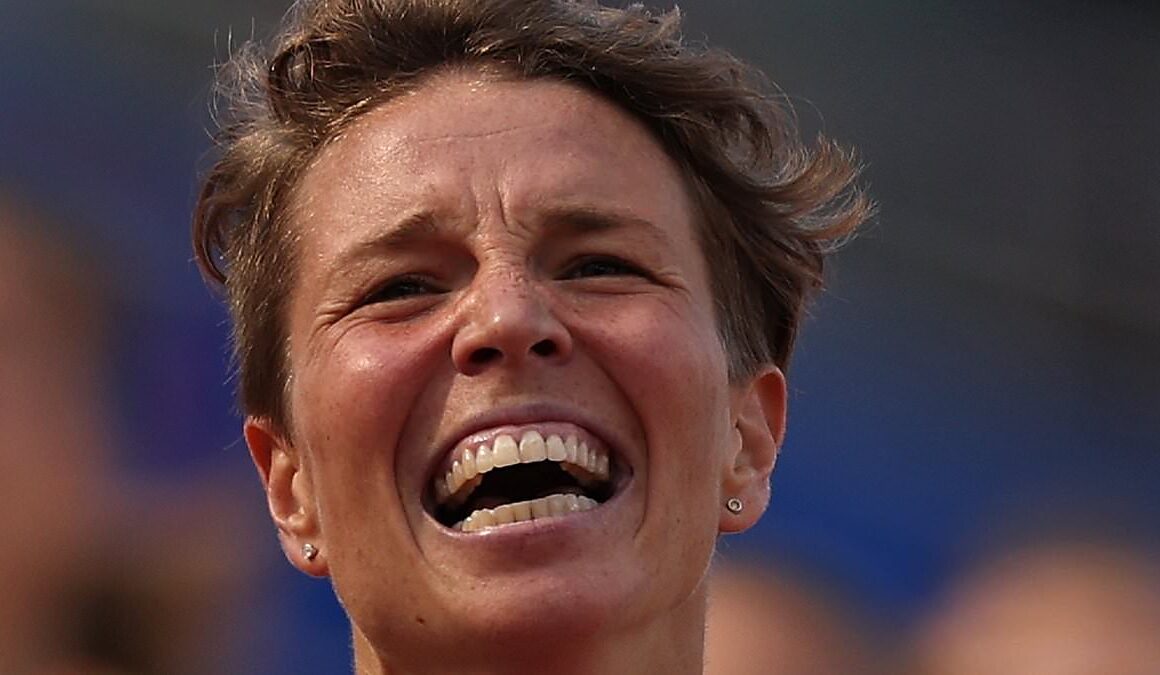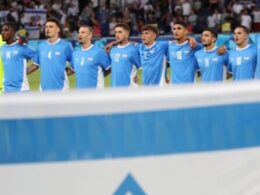Just two transgender athletes will compete at the Paris Olympics after rules were tightened since Tokyo 2020, MailOnline can reveal today.
The clampdown came because of the ongoing row over whether some trans women have an unfair advantage over biological women because of strength and testosterone many banked up in puberty.
American runner Nikki Hiltz, 29, and Canadian footballer Quinn, 28, both of whom identify as transgender and non-binary, are in France for the world’s greatest festival of sport.
But swimmer Lia Thomas is out of Olympics after losing a legal battle last month and New Zealand weightlifter Laurel Hubbard, the the first openly transgender athlete to compete at the last Olympic Games, is also absent.
Laurel was one of four trans athletes at Tokyo 2020.
British trans cyclist Emily Bridges had hoped to aim for a spot in the Paris Olympics. But after British Cycling barred transgender women from competing in the female category in 2023, she says she has given up on competing at the elite level.
Hubbard, Bridges and Thomas all transitioned from male to female after the age of 12, which means they are now ineligible.
Nikki Hiltz and Quinn identify as transgender and non-binary. But both were born women and are competing as women, so therefore are eligible to represent the US and Canada respectively.
Nikki has postponed testosterone hormone therapy so they could qualify for the women’s division of the 1,500 metres. ‘Going to the Olympics is such a dream of mine,’ they said last year, adding: ‘But it’s also such a dream of mine to take testosterone or grow facial hair or have top surgery, and so I think sometimes I can really resent this sport.’

Nikki Hiltz celebrates after crossing the finish line to win the women’s 1500 metre final in Oregon, securing the transgender athlete a place at Paris 2024

Quinn of Canada controls the ball in a match against Nigeria. The defender will star in Paris

Lia Thomas had challenged World Aquatics rules in a bid to be able to compete at Paris 2024, but lost

British cyclist Emily Bridges had previously expressed hope of competing at the Olympics – but has given up after the rules changed

The participation of Laurel Hubbard in the women’s weightlifting was a major story in Tokyo. If Hubbard, who was born a man, had tried to qualify for Paris, the athlete would not have met the more strict criteria
Heading towards Paris 2024, there has been a seismic shift in the sporting landscape for trans athletes with the pendulum swinging back towards tighter measures.
These new more stringent requirements make it extremely unlikely a transgender woman would have qualified for the Games.
In fact there are now no transgender women athletes competing at Paris because they needed to have transitioned before the age of 12.
For example, Laurel Hubbard retired after a poor performance in Tokyo where she failed to record a valid lift.
Fast forward to today, she would find herself ineligible for the Paris Games after the International Weightlifting Federation tightened its eligibility rules.
Transgender athletes face heavier restrictions across the board when compared to Tokyo 2020.
The International Olympic Committee (IOC) updated its guidelines in January on the participation of transgender athletes in the Olympic Games.
It allowed individual sports to determine whether trans athletes can compete – and in most cases it has led to a tightening of rules, especially impacting trans women.
But this means that there are no blanket guidelines, meaning a trans woman may be able to play tennis or badminton at the elite level but not track and field events.
Last year World Athletics announced that it would ban any athletes who have gone through ‘male puberty’ participating in women’s world rankings competitions.
World Athletics president Sebastian Coe has been at the vanguard – and says that the regulations are ‘here to stay.’
Mr Coe’s logic is that anyone who has grown up male must be kept out of female events in World Championships and Olympic Games for fairness.
On top of this, at least 10 Olympic sports have restricted the participation of transgender athletes.
These include sports such as cycling, swimming, rugby, rowing, and boxing.
The International Cycling Union has also imposed more stringent rules, also related to transgender women who transitioned after puberty from participating in women’s events.
They have also brought in new ‘open’ categories where transgender athletes can compete against each other.
World Rowing has issued a near-blanket ban on the participation of trans women in female categories, while rugby and cricket have banned trans women from competing in female categories completely, claiming there are safety concerns.
Other sports allow transgender athletes to compete on a ‘case by case’ basis.
In certain sports including archery and the triathlon, transgender athletes who want to compete in a female category must have testosterone levels less than 2.5 nanomoles per litre for 24 months.
At the time of the Tokyo Games, these rules were more relaxed and the levels of testosterone had to be below 10 nanomoles per litre – and only for a year.
Nikki Hiltz, who lives in California, wrote about the issue recently, as they achieved their Olympic dream.
The athlete said: ‘I have a very distinct memory from my sixth birthday. When I blew out the candles on my birthday cake, I wished that the next morning, I would wake up a boy.
‘Six-year-old me expressed my gender identity through having short hair, wearing baseball caps, and refusing to wear dresses. I felt most like myself when I was playing football with the boys during recess, when my dad called me Nick instead of Nikki, and when the substitute teachers would mistake me for a boy.
‘What I didn’t know then was how to explain that my gender identity differs from the sex I was assigned at birth. While I’ve felt this way my whole life, I only recently came out about it publicly.
‘So I’ll share it here again: I’m transgender, I don’t identify with the sex I was assigned at birth, I currently describe my gender as non-binary, and I prefer they/them pronouns’.
Quinn has described being proud to be a trans athlete, representing Canada at Tokyo 2020 and now at Paris 2024.
‘That was one of the reasons why I came out publicly, it’s because I want to be visible and I think the Olympics is a massive platform to have that visibility,’ the footballer said.
‘It’s my hope that I might be the first and that’s really exciting, but it’s also my hope that there are other people following in my footsteps and so I hope that it opens the door to other trans athletes being represented at the Olympics.’
Since 2004, transgender athletes have been allowed to compete at the Olympics.
But in recent there have been huge rows over their inclusion, especially transgender women who transitioned from being men after puberty.
Athletes including British swimming star Sharron Davies, who won golds and silvers, in her Olympic career have been outspoken on the issue.
The ex-Great Britain swimmer has frequently and publicly expressed her concerns in relation to self-identification in sport, insisting that transgender athletes have an unfair advantage because of their enhanced levels of testosterone compared to women.
Swimmers like Lia Thomas have argued that they have lost muscle mass and strength through testosterone suppression and hormone replacement therapy.
Lia has been at the vanguard of the trans lobby.
The swimmer demanded to be allowed to compete in Paris.
Thomas, 25, had asked the Court of Arbitration for Sport to overturn a ban on biological males competing against women in hopes of racing at the Games.
The athlete first rose to prominence after becoming the first transgender athlete to win a NCAA college title in 2022 and has since been banned from competing against biological women in international events following a change in regulations.
World Aquatics changed its policies so that transgender women can only compete in women’s races if they have completed their transition by the age of 12.
Thomas argued those rules should be declared ‘invalid and unlawful’, and broke the Olympic charter and the World Aquatics convention.
But in a decision handed down at the court of arbitration for sport in June, the panel concluded that Thomas wasn’t ‘entitled to engage with eligibility to compete in WA competitions’World Aquatics welcomed the news, hailing it as a ‘major step forward in our efforts to protect women’s sport.’

Lia Thomas accepts the winning trophy for the 500 Freestyle finals as second place finisher Emma Weyant and third place finisher Erica Sullivan watch in March of 2022
Have transgender athletes competed at the Olympics before?
Yes.
Canadian women's football player Quinn became the first openly transgender athlete to participate in the Olympics when they lined up in their opening match at the Tokyo Games.
Quinn had come out as nonbinary and transgender in 2020 and uses the pronouns they/them. They were permitted to carry on playing women's football having been assigned female at birth, instead of using their gender identity.
Quinn made history by featuring in Canada's 1-1 draw at the tournament and expressed optimism rules would change in the future.
'I feel proud seeing 'Quinn' up on the lineup and on my accreditation,' Quinn wrote on Instagram at the time.
'I feel sad knowing there were Olympians before me unable to live their truth because of this world. I feel optimistic for change. Change in legislature, Changes in rules, structures, and mindsets.
'Mostly, I feel aware of the realities. Trans girls being banned from sports. Trans women facing discrimination and bias while trying to pursue their Olympic dreams. The fight isn't close to over... and I'll celebrate when we're all here.'
Quinn became the first transgender athlete to win an Olympic medal when Canada won gold in the Japanese capital. They had also won bronze at Rio 2016.

Quinn, who has always competed in women's events, won Olympic football gold in Tokyo
The Tokyo Games had seen significant discussion over the presence of New Zealand weightlifter Laurel Hubbard. Hubbard had become the first openly trans woman to compete at the Olympics when the then 43-year-old featured in the women's over-87kg event.
Hubbard had notably won a silver medal at the 2017 World Championships and a gold medal at the 2019 Pacific Games after transitioning in 2012.
The New Zealander had been permitted to compete having met the rules under the IOC's 2015 consensus statement. These included demonstrating her total testosterone level in serum had been below 10 nanomoles per litre for at least 12 months. The IOC had acknowledged before the Games that the 2015 consensus statement had become outdated.
Hubbard would ultimately fail to make a lift in the competition, but later issued a statement thanking the IOC for their support.
'I am not entirely unaware of the controversy which surrounds my participation at these Games,' Hubbard said. 'And as such I would particularly like to thank the IOC for, I think, really affirming its commitment to the principles of Olympism and establishing that sport is something for all people, it is inclusive, accessible.
'Similarly, I would like to thank the International Weightlifting Federation. They have been extraordinarily supportive. I think that they, too, have shown that weightlifting is an activity that's open to all the people of the world.'
BMX Freestyle cyclist Chelsea Wolfe had travelled with the United States team for the Tokyo Olympics as an alternate, but ultimately did not compete.

Hubbard was the first openly trans woman to compete at the Games but failed to make a lift
What are the rules now?
The IOC released a new framework on transgender athletes in November 2021 following a two-year consultation.
Crucially the organisation handed over responsibility to individual federations to determine eligibility criteria in their sport, based upon 10 principles in the framework.
The framework said no transgender woman or DSD athlete should be assumed to have a physical advantage over female athletes without evidence to prove otherwise.
It further stipulated athletes should be allowed to compete in the gender category of their choice as long as fairness is not compromised. International federations were urged to consider ethical, social, cultural and legal aspects when devising rules.
The IOC's approach has faced criticism, with tennis legend and gay rights activist Martina Navratilova having accused the organisation of 'passing the buck'.
Several federations initially tightened rules around the level of nanomoles per litre of testosterone trans athletes were permitted, including tennis, triathlon and rowing. A number have also introduced outright bans.
World Rugby became the first international federation to enforce a ban on trans women competing in elite women's events back in 2020.

World Athletics, led by Seb Coe, have excluded male-to-female transgender athletes who have been through male puberty from competing in female events
The organisation made the move after finding a 'at least a 20-30 per cent greater risk' of injury risk factors when a female player is tackled by someone who has gone through male puberty.
World Swimming approved a ban in 2022 on trans athletes competing in women's swimming races if they went through male puberty.
World Athletics and the International Cycling Union followed suit in 2023.
'The World Athletics council has taken the decisive action to protect the female category in our sport,' World Athletics president Lord Coe said when announcing their policy in March 2023.
'The council has agreed to exclude male-to-female transgender athletes who have been through male puberty from female world ranking competitions from March 31 this year.
'The decision that the council made is a primarily principle-based decision and that is the overarching need to protect the female category. This is what our sport is here to do.'
Are any transgender athletes competing in Paris?
The United States will be represented by Nikki Hiltz in the women's 1,500m at Paris 2024.
Hiltz identifies as transgender non-binary and uses the pronouns 'they/them' after coming out in 2021. They wrote on Instagram: 'Hi I'm Nikki and I'm transgender. That means I don't identify with the gender I was assigned at birth. The word I use currently to describe my gender is non-binary.
'The best way I can explain my gender is as fluid. Sometimes I wake up feeling like a powerful queen and other days I wake up feeling as if I'm just a guy being a dude, and other times I identify outside of the gender binary entirely. It's complicated and complex and something I'm still trying to navigate myself, but I've decided it's time to share my gender fluidity with you all.'

Nikki Hiltz, who is biologically female but identifies as transgender non-binary, has qualified for Paris 2024

Hiltz won the women's 1500m at the United States Olympic trials last month to qualify
The 29-year-old qualified for the Games by setting a US trials record of 3 minutes and 55.53 second earlier this month.
'I literally can't believe it. I mean, this is bigger than me,' Hiltz told NBC Sports. 'It's the last day of Pride month. I wanted to run this one for my community, and yeah, all the LGBTQ folks. You guys brought me home that last hundred. I could just feel the love and support.'
Hiltz competed at the collegiate level at Oregon and Arkansas in the mid-2000s and garnered All-American honours in 2018.
They also won a silver medal in the 2024 World Indoor Championships in Glasgow, Scotland, and gold in the 2019 Pan American Games in Lima, Peru.
Hiltz qualification for Paris 2024 was celebrated by American football star Megan Rapinoe, who has loudly advocated for trans athletes.
Canada's Quinn is again competing at the Games, with the reigning Olympic women's football champions beginning their campaign ahead of the Opening Ceremony.

Hiltz qualification for the Paris 2024 Olympic was celebrated by football star Megan Rapinoe

Quinn is again part of Canada's Olympic team and played in their first match on Thursday
Have any athletes been banned?
The change of regulations across multiple sports has seen several athletes with Olympic ambitions be unable to compete at Paris 2024.
Lia Thomas is the most notable having challenged World Aquatics rules at the Court of Arbitration for Sport.
Thomas, 25, first rose to prominence after becoming the first transgender athlete to win an NCAA college title in 2022. World Aquatics rules were introduced three months after Thomas' victory.
The swimmer had swum for the Pennsylvanian men's team for three seasons before starting hormone replacement therapy in spring 2019.
Thomas asked CAS to overturn World Aquatics rules, stating they should be declared 'invalid and unlawful' and in breach of the Olympic charter.
CAS rejected the appeal, noting that Thomas was 'simply not entitled to engage with eligibility to compete in WA competitions' having not been a member of USA Swimming.

Thomas' appeal was rejected by the Court of Arbitration for Sport last month to end her hopes
World Aquatics had declared the decision to be a 'major step forward in our efforts to protect women's sport', with the the governing body having reportedly been prepared to also have the case argued on scientific merits.
Wolfe, who was eligible for the Tokyo Olympics, has been unable to qualify for Paris 2024 under cycling's stricter rules.
Similarly, British cyclist Emily Bridges had previously expressed a desire to compete at the Olympics but was blocked by British Cycling and UCI rules.
Earlier this year, Bridges vowed to take British Cycling to court over its ban on transgender women from competing in the female category.
French sprinter Halba Diouf was also unable to qualify for the Games under World Athletics' rules. The Senegal-born athlete had undergone hormone therapy to change sex, and her gender transition was recognised in 2021.
The sprinter had been hoping to compete in the 200m at Paris 2024.
Diouf had told the news agency Reuters last year that she felt 'marginalised' and that transgender athletes were being 'hounded' due to the rules.


BMX rider Chelsea Wolfe travelled to Tokyo 2020 as an alternate but cannot compete in Paris
IOC's warnings on transgender reporting
Last month, the IOC published a 33-page document telling journalists not to use a list of 'harmful' words when reporting on transgender athletes at the Games.
A similar document had been produced for the Olympics in Tokyo by the organisations GLAAD, Athlete Ally and PrideHouse Tokyo.
Leaflets with a link to the guide were distributed for media professionals ahead of Hubbard's weightlifting event.
The latest document has seen the IOC warn the media against using terms such as 'born male', 'born female', 'biologically male' and 'biologically female', which they claim is 'problematic language'.
The IOC also urges the press to avoid 'sex change', 'post-operative surgery' and 'transsexual'. They said these phrases 'can be dehumanising and inaccurate' when describing transgender sportspeople and athletes with sex variations.
The body has also provided alternatives for journalists to use in their reporting of transgender athletes during the Olympics in Paris, including girl/boy, woman/man, transgender girl/boy, transgender woman/man and transgender person.
'It is always preferable to emphasise a person's actual gender rather than potentially calling their identity into question by referring to the sex category that was registered on their original birth certificate,' the IOC document reads.

Members of the media were given a guide to covering LGBTQ athletes at the Tokyo Olympics

The IOC has published a guide for Paris 2024 outlining a list of 'harmful words' for journalists to avoid
An IOC spokesperson said: 'The Olympic Games are the only event that brings the entire world together in these difficult times.
'The Olympics are about athletes from all corners of the world, from many different backgrounds and different beliefs, competing in peaceful competition. In this divided world, it is something precious we should all cherish.'








